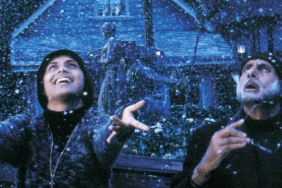
The tragically beautiful and sexually charged Black Swan is an examination of the will of a performance artist in search of perfection. It’s a drum roll that builds to a striking crescendo with occasional stabs from the strings, cutting into the heart of the narrative, keeping the viewer on alert. Described as a psychological thriller set in the world of New York City ballet, it hides none of its mystery but at the same time isn’t out to fill in the blanks.
Director Darren Aronofsky (The Wrestler), working from a script penned by Mark Heyman, Andres Heinz and John McLaughlin, brings the story of a ballerina preparing for her first featured performance and her gradual descent into darkness to enchanting heights. Playing with the fact this is a film centered in the world of ballet, Aronofsky uses the beauty, elegance and the innate competition of this world to toy with the audience, setting you at ease just as quickly as he pulls the rug out from under your feet. Make no mistake, while Black Swan is a movie about a ballerina, it is just as suspenseful as it is beautiful.
The film centers on Nina (exquisitely played by Natalie Portman), a passionate ballerina who’s been chosen as the featured dancer in the company’s first production of the new season, “Swan Lake.” Asked to play both the graceful White Swan and the seductive Black Swan, the pressure begins to mount and tests her emotional range. Nina’s a dancer more suited as the technical innocent rather than the sensuous siren. She’s encouraged in a variety of ways by her director, Thomas Leroy (Vincent Cassel in a solid, by-the-book performance), but while he recognizes her technical proficiency is perfect for the White Swan, he still doubts her ability to become as uninhibited as necessary for the part of the Black Swan.
Nina’s pursuit for perfection is workmanlike and it weighs on her both physically and mentally. Her relationship with her devoted (perhaps overly so) mother (a well rounded performance from Barbara Hershey) becomes fragmented and a twisted rivalry with Lily (Mila Kunis), the company’s newcomer and a ballerina that’s as unbridled as Nina is restrained, begins to take shape.
Comparisons to Michael Powell and Emeric Pressburger’s The Red Shoes are guaranteed and while there is a likening to be made — considering both find a measure of intensity — Black Swan is a horror film compared to the intensity of The Red Shoes. It’s a film where you begin to believe anything is possible. Aronofsky never commits himself to the psychological head games nor does he always stick to the straight-forward drama. He walks a line between the two with ease and never teeters, causing the audience to never feel safe and his cast is up to the task.
Natalie Portman is at her finest in a role that requires every ounce of her talent. Portman studied ballet until she was in her early teens and most of the ballet work you see here is her, including a spectacular, on point prologue. But more important is the emotional depths she goes to bring her character to life. This must have been a taxing performance for Portman but the film benefits greatly.
Kunis is also proving to be a quality up and coming actress that’s pretty much shed her days from “That ’70s Show” and is beginning to come into her own as a film actress. And a supporting performance from Winona Ryder as the one-time featured dancer Beth MacIntyre whom Nina has pushed out shows Ryder at her best in a limited role. Her performance is likely part of the reason Portman stepped up her game to the level she achieved.
Aronofsky and his long-time cinematographer Matthew Libatique (The Fountain, Requiem for a Dream) tackle the dance scenes with force and his use of mirrors to manipulate the portions of the story is outstanding, particularly a club scene that I can’t wait to see again.
Black Swan is sexual, suspenseful, sensual and thrilling. Clint Mansell’s score brings Tchaikovsky’s “Swan Lake” theme to sensational heights and folks that were in my screening were humming it as they walked out. This is a film that consumes you one minute at a time and by the end you’ve been chewed into 103 different little pieces, ready to watch it all over again.










